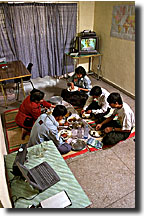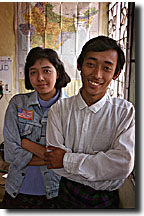
|
|
|
Burmese political exiles in New Delhi, India, have lunch while listening to a smuggled videotape of Aung San Suu Kyi, Burma's Nobel Prize-winning opposition leader. (Photograph by Pablo Bartholomew)
|
|
In addition to news and notes on activism -- for example, promoting a boycott of PepsiCo, which has bottled soft drinks in Burma since 1991 -- the Free Burma website posts personal accounts of torture such as that of Naw May Paw, 55: "My whole legs were horribly burned by the hot dagger being drawn up and down. . . . Then they tied me up and beat me around the hips with a bamboo pole. I was screaming, 'I'm going to die.' They shouted at us: 'Tell us about the rebels!' But we're just village women; we don't know anything about that." Online activists won a big battle in December 1995 against the Voice of America; according to the students, it had been broadcasting a steady stream of propaganda favorable to Burma's regime. When activists got their hands on a U.S. government cable documenting the biased reportage, they posted it on the Net at one in the morning. Seven hours later, the director of Voice of America called them for a meeting and reassigned the guilty parties. Since then, the programming has improved immensely. Burmese officials, not known for being cyber-savvy, are beginning to appreciate the power of the Net themselves. The Burmese Embassy in Washington, D.C., has assigned an intelligence agent to keep tabs on the online activism, says Strider. "I was amused that his function in life is to monitor the Net war."
|







